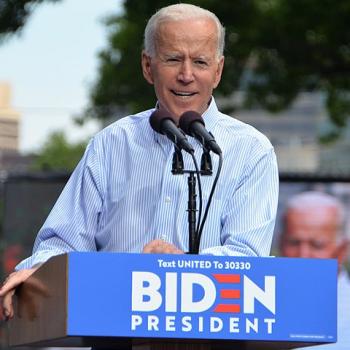
Joe Biden won.
Donald Trump, who once mocked the president-elect as “sleepy Joe…hiding in his basement,” is himself now holed up in the White House, mostly unseen, except on Twitter, where he indulges in debunked conspiracy theories about the election.
Mr. Biden, meanwhile, is preparing for his swearing-in on January 20, and is doing the one thing that Mr. Trump has failed to do since last spring: working on a plan to deal with the global coronavirus pandemic.
And Mr. Trump? On the day the United States death toll from COVID-19 officially passed 250,000, Mr. Trump just kept tweeting—about anything other than COVID.
In the midst of all this, I received an email from the Society of G.K. Chesterton (formerly the American Chesterton Society), announcing the latest issue of Gilbert! (formerly Gilbert).
A ‘radical’ idea
With an unerring instinct for the key issues facing Catholics today, the headline stories include a new name for Distributism (it’s going to be “Localism”); yet another article about G.K. Chesterton and Clarence Darrow; and an article by David Deavel on the connection between Chesterton and Conan the Barbarian.
There also was a free preview of this month’s editorial by Society president Dale Ahlquist: “A Radical Idea That Might Not Be So Radical.” I figured I’d better read it: surely this would be the place where we’d finally hear something about how Chesterton might tackle some of the serious issues facing us all.
I should probably mention here that I was the editor-in-chief of Gilbert! for fourteen years. I have unhappily criticized my old colleague before. I regret that I must criticize him once again.
Because it turns out that Mr. Ahlquist’s “radical” idea—using an essay by his friend Chuck Chalberg as a springboard—is to completely defund public education. This isn’t even as radical an idea as Mr. Ahlquist thinks it is, at least in part. Diverting education funds to parents, in the form of education vouchers, or school vouchers, is an old idea. Completely defunding schools and giving all the money to parents? That’s new. But Mr. Ahlquist is a man on a mission, a mission that becomes clear at the end of his editorial. More on that later.
Undermining localism
“The idea is to fund parents directly, rather than schools directly,” he writes. My first thought was: what will happen to thousands of suddenly unemployed teachers—to say nothing of secretaries, cooks, custodians, and other support staff? Then there is the matter of what to do with empty school buildings. Want to destroy a neighborhood? Convert a vibrant, useful building into an empty, boarded-up building. But when you’re on a mission, why sweat the details?
Mr. Ahlquist continues:
Let the state legislature decide the going rate for the education of a K-12 age child, and then let the parents decide where that child should be educated and how that money should be spent. It’s called school choice. A radical idea? No doubt. But this is a radical idea that will directly empower parents…
Mr. Ahlquist, who thinks Distributism would be more marketable if it were rebranded “Localism,” does not seem to realize that few levels of government are more local than public school districts. Minnesota has 336 school districts. Each of these is local and responds to local feedback—and if you don’t think a school district responds to feedback, you have never been to a school board meeting in a room filled with angry parents.
But Mr. Ahlquist wants to hand all this local activity off to the state legislature instead. Does the Minnesota state legislature even have time or resources to “decide the going rate for the education of a K-12 age child” for 336 local school districts? And how will this empower parents? Right now, any parent can attend a local school board meeting and have his or her say. If this is kicked up to the state legislature, then every parent from Beaver Creek to Grand Portage will be competing with parents from Minnesota’s other 335 school districts to get a word in edgewise in the legislative education committee hearings. Have fun with that.
And which parents is Mr. Ahlquist talking about? Presumably, the kind of parents who send their children to the prep school Mr. Ahlquist co-founded in 2007, Chesterton Academy. The kind of parents who attend its fundraisers.
Avoiding a hard truth
As we read on, two things become clear. First, Mr. Ahlquist is not an expert on public education or on how to fund it.
And second, he thinks the central role that slavery played in America’s founding is no big deal. Yes, he goes there.
He laments:
To believe that our country was founded by slaveholders for slavery is to believe that what became the USA was rotten at its core.
We can debate whether the fledgling United States was “rotten at its core,” but it is indisputable that many of our Founders owned slaves, and that slavery played a big role in how we saw ourselves and defined ourselves as a nation. In any case, Mr. Ahlquist seems anxious not to face the idea that slavery is America’s original sin.
Instead, in the year that George Floyd was strangled to death by cops in broad daylight in Mr. Ahlquist’s own hometown, he tut-tuts that “a troubling number of [America’s] young” have come to understand that America’s founding and subsequent race history is simply not as rosy as he would like to pretend. He blames public education for this:
After all, why should we keep paying for public schools to teach our children a deliberately distorted picture of the past and reasons to hate their own heritage?
The solution? Here, Mr. Ahlquist circles back to his original point: “Ceasing to fund public education might be a good place to start.”—although he conspicuously fails to draw any direct causal link between defunding public schools and engendering in America’s youth a better understanding of U.S. history.
It never seems to have occurred to him that for every parent who will want a school that teaches what Mr. Ahlquist believes to be a fair version of U.S. history, there will be another parent who will want a school that teaches a different version. And another parent, who will want yet another version. Education would soon devolve into a free-for-all, dominated by every passing crank with time on their hands and an axe to grind.
The usual bogeymen
But Mr. Ahlquist hasn’t got time for troublesome realities like this—because by now, he’s on right-wing platitude autopilot:
G.K. Chesterton prophetically lists the four main problems that we still face: Big Government, Big Business, Feminism, and Public Education. The first two, also known as Hudge and Gudge, have certainly made a show under the Covid Plague to crush freedom and independence. Feminism has given us abortion and the disintegration of the family.
Ah, Feminism. The Catholic Right’s favorite bogeyman—after abortion. Yes, Mr. Ahlquist manages to work that in too— but with the same careless illogic that he displayed when he tried to link defunding public schools with children learning accurate history. Feminism gave us abortion? Newsflash: all seven Supreme Court justices who voted to legalize abortion in Roe v Wade were men. Also, it is often men—men with attitudes toward women that are the very opposite of feminist; men who, like Mr. Trump, boast about “pussy grabbing”—who coerce terrified women into having an abortion.
And also—I hate to break it to Mr. Ahlquist—but abortion actually predates feminism by a few millennia, or otherwise the early Christians in Rome would not have felt compelled to mention it in the Didache.
But perhaps, like Mr. Trump, Mr. Ahlquist is not worried about letting facts get in the way of making a right-wing talking point.
Facts don’t trouble Mr. Ahlquist in his COVID denial either—a denial all the more shocking in the week when American dead passed a quarter of a million human beings. But that’s a subject for another essay. Suffice it to say for now that I am disappointed to see him link devotion to Chesterton with the denial of science, with gross imprudence, and with a callous disregard for human life.
A man on a mission
I spoke earlier about Mr. Ahlquist being a man on a mission. His final paragraph is what gives away the game. I quote it in full:
In the meantime, however, there is a local solution to our education problem: start your own school. (We can show you how to start a classical Catholic high school, if you’re interested.) If enough people start good small schools, the big bad schools—which are already unsustainable—will find themselves with not enough students even to pretend they are worth public support. We can shut down public education by eliminating not only the excuses for it, but the demand for it. And we can do it from the bottom up.
“We can show you how to start a classical Catholic High School, if you’re interested.”
If you are starting to suspect the entire essay is a glorified commercial for something—you’re right: it looks like Mr. Ahlquist is quietly pushing his own Chesterton Academy and the Chesterton Schools Network.
Since Mr. Ahlquist founded the original Chesterton Academy, the schools—as opposed to promoting Chesterton scholarship in its own right—have been his primary focus. Every speech I have heard him give since then, eventually arrives at a pitch for education—as envisioned by a Chesterton Academy.
The nitty-gritty
Here’s the nitty-gritty: the biggest indicator of how well a child will do in school is not whether he or she is educated in a public school, or at home, or at a posh private school like a Chesterton Academy. The biggest indicator is poverty. Because in poor households, whether they’re headed by one parent or two, guess what? People are too busy scraping by to pay much attention to whether kids are doing their homework, or even getting to school during the day. And the poor move around a lot, going to where work is. A child in a poor household will change schools at least twice during a school year, maybe more.
And then there’s hunger: the government-funded breakfasts and lunches that poor children get at school may be the only meals they eat all day.
Even more horrifying, in poor households, with few if any books and the TV always blaring, young children learn only a fraction of the vocabulary that other children learn. So poor children can arrive at pre-school and kindergarten literally not knowing the language spoken by their teacher or their classmates. They are behind before they even start school.
And no amount of empty platitudes about parental control or the evils of feminism will change any of this.
Mr. Ahlquist dances past these basic facts and problems as if they don’t exist. It’s almost as if Mr. Ahlquist has erected a hasty strawman about the evils of public education, purely to promote his chain of schools. Yes, a chain—named for a man who distained chains.
Mr. Ahlquist introduced me to Chesterton in the late 1990s. Along with J.R.R. Tolkien, it was Chesterton who freed me from the narrow and suffocating conservatism I adhered to back then. I hope and pray that Mr. Ahlquist can rediscover the GKC he introduced me to.
Until that happens, G.K. Chesterton—a man famous for his deep distrust of right-wing plutocrats and for his passion for truth—is rolling in his grave.











